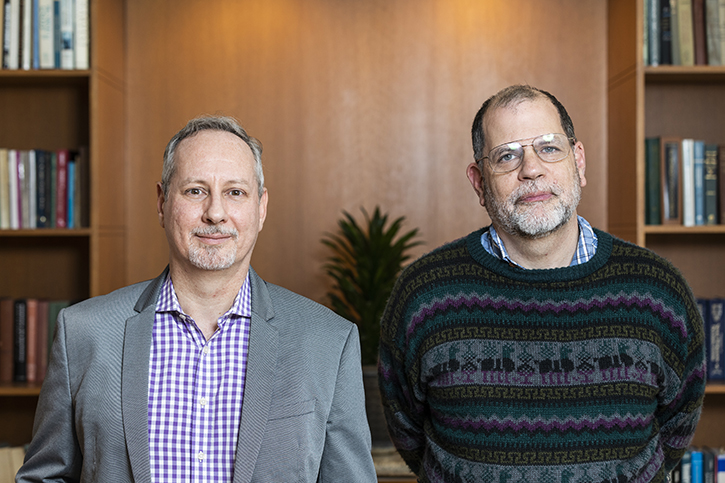
Co-creators of Marginal Revolution Alex Tabarrok, director of the Center for Study of Public Choice and the Bartley J. Madden Chair in Economics at the Mercatus Center, and Tyler Cowen, director of the Mercatus Center and professor of economics. Photo by Lathan Goumas/Strategic Communications
Millions of historical and culturally significant writings, photographs, recordings and maps form the collection of the largest library in the world—the Library of Congress. This year, Marginal Revolution and Coordination Problem, two blogs written by professors in George Mason University’s Economics Department, were selected for inclusion in the library’s historic collection of internet materials related to the Economics Blogs Web Archive.
“Marginal Revolution and Coordination Problem are two of the most visible and important economics blogs being written today,” said Daniel Houser, director and chair of Mason’s Economics Department. “Inclusion in the Library of Congress certifies these blogs as highly important literary activity, which hold scholarly value not only for current readers, but which are expected to be of scholarly value for readers in generations to come.”
Marginal Revolution, started in 2003 by Tyler Cowen and Alex Tabarrok, and Coordination Problem, created by Peter Boettke in 2005, discuss events in and around the world of economics with a goal to positively influence the world.
“We think teaching economics can actually make the world a better place,” said Tabarrok. “What we try and do in our textbook and also in our writings is to help people see ‘the invisible hand’ [a metaphor of the 18th-century economist, Adam Smith], which means to help them see the situations in which the pursuit of self-interest leads to the social good. If you could find the conditions under which [that happens], then you have the conditions to build a powerful civilization.”
And the information applies beyond the field of economics.

Peter Boettke, creator of Coordination Problem blog, is a University Professor of Economics and Philosophy, the BB&T Professor for the Study of Capitalism, and the Director of the F.A. Hayek Program for Advanced Study in Philosophy, Politics, and Economics at the Mercatus Center.
“The economic way of thinking can shed necessary light and provide understanding on pressing issues of concern to scholars across the social sciences and humanities, as well as to the general public that is interested,” said Boettke, whose blog reaches readers internationally and has inspired people to further their formal education in economics.
Marginal Revolution also reaches readers across the globe. Included in the mix are readers at the New York Times and the Wall Street Journal, as well as influential figures like Bill Gates and former president Barack Obama.
The blogs also take the Mason “classroom” into new territory.
“Every day I get a bunch of messages,” Cowen said. “People say, ‘You’ve changed my life.’”
Many of these people have changed their studies to economics, realized they could pursue a nontraditional path in life, ended up working with Cowen on projects or were inspired to travel more.
On international travels and in emails, all three professors have received recognition from their readers abroad who can’t get enough of their writings.
“That’s amazing to think that there are people out there who think of us as their professors—not just George Mason students, but those who don’t have access to the quality education available here at Mason,” Tabarrok said.
“That’s our pledge—to give that to the world,” Cowen said.
Mason’s Economics Department was one of the first in the world to recognize the value of blogging and use it to educate the wider public, Houser said.
“Mason supported us from the beginning, even though blogging was considered weird [and a new development at the time],” Cowen said.
The support stems from Mason’s mission to be a university for the world, Houser said.
“There is no better example of this than the economic blogging activity of our faculty,” he added. “Through this activity, they take steps toward bringing scientific economic knowledge to all parts of our diverse world, using a perfectly inclusive medium freely available to any with access to the internet.”
Cowen, Tabarrok and Boettke plan to keep on writing and are thrilled their discussions will be made available for generations in the Library of Congress.
“I hope our discussions of ideas—methodological and analytical, historical and philosophical—will also stimulate thought in the future,” said Boettke.
